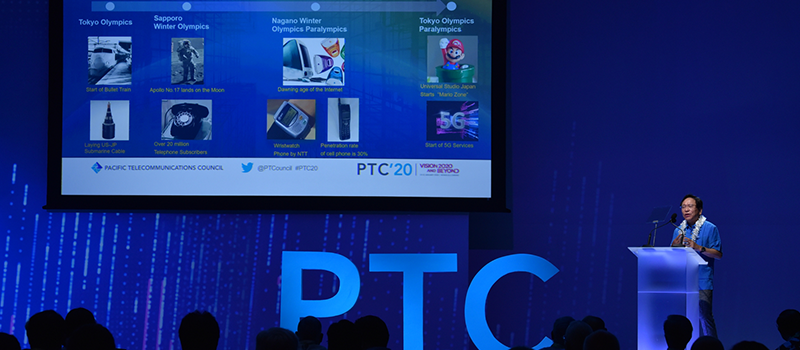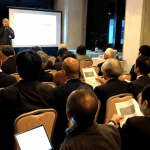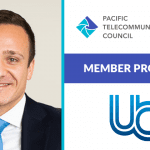
If PTC’20 was a barometer of the Pacific ICT sector, it was probably a pretty good one. Both are in rude health, breaking records, and each seems to be powering to even greater success. There are few superlatives left to describe what we are seeing. We are clearly in the epicenter of an explosion of connectivity and capacity throughout the region and one that looks set to continue with profound implications for everyone.
Understanding the jigsaw of ideas presented here is, indeed, a challenge in itself. Make what you will from my personal takeaways this year:
- Long-haul transoceanic subsea capacity build is soaring. Much more is about to come on stream with more cables than ever in the pipeline. But there are gaps. We see shortfalls in matching intra-Asian capacity. As ever, matching supply, demand, technology, and pricing on a co-ordinated timetable challenges everyone. How many cables in the future? What capacity will they have? Will we get into the petabit era anytime soon?
- Infrastructure build driven by OTTs continues at a breath-taking pace (and spend).
- Staying with subsea, geopolitics has entered the region with a vengeance. Sovereignty and national security issues are now becoming gatekeeper functions in major markets, particularly the U.S. Experts asked if future systems will radically change strategy and opt for bypass routes.
- Satellites are powering back with a continuing multiyear upswing. As if to emphasize the point, PTC’20 saw Kacific-1 scheduled to enter commercial service. The satellite has an addressable market of 600 million people and is capable of supplying affordable service to thousands of schools, clinics, and other centers in the South Pacific and Southeast Asia.
- We are within touching distance of LEO constellations providing broadband globally.
- 5G is on the way, of course. PTC’20 debated impacts and use cases, but no one doubted it meant more of the base commodity flowing through networks: data.
- And more data means more data centers, a lot more and a lot closer to the user. The talk was of hyperscale, yes, but also Tier 2 and Tier 3 locations. Everywhere we looked we saw edge references. But in the age of fluid networks where will these edges be? There is perhaps some (semantic) confusion between buildout and edge capability.
- AI, another driver seen ahead, is capable of some very clever things. It is also capable of some very stupid things, stated experts, who said we needed to see more “I” in the acronym. Nevertheless, who can fail to be impressed by robot systems that can solve a Rubik’s Cube challenge, or AI evaluators that correctly predict the likelihood of heart disease from scans, or even formulate Hollywood movies given script outlines?
Are there problems? In the weeks leading up to PTC’20, we saw some subsea and LEO constellation players enter Chapter 11 or simply shuttering. We speculated on causes and consequences, not least the possibility of a major downturn in prospect. At PTC’20, in corridor conversations, many thought these were largely isolated missteps caused by market factors, but admitted price declines on many major routes to be savage.
More broadly, we wondered about how this industry will navigate globally. We are no longer a “telecom” industry but a “digital” one. This is an important point because not only is the industry in the middle of a transformation wave itself, it is obviously transforming all other socio-economic sectors. Transforming, in fact, is perhaps too tame a term. Shaking is probably closer to the mark. Global digitalization is shaking–and redrawing–the foundations of planetary life. The data economy is making global behavior remarkably fluid, and as one speaker pointed out, in borrowing from sci-fi writer William Gibson, even “post-geographic”.
The paradox, of course, is that in the midst of plenty (in terms of general rollout), countries and organizations lacking a coherent perspective and commitment are going to fall behind. We saw that now, this is a nonlinear behavior. The gap, in short, will increase.
At PTC’20, there were calls for new dialogues to try to solve these problems. In suggesting that policy issues now dwarf technology ones, there were calls for the industry, in its hyperactivity, to explain itself better to governments where the issues and economic benefits are all too often poorly understood. And given the dramatically shifting scenarios involved, the urgency to do so is now here.
Against this, we saw discussions of remarkable stories. In Myanmar, after the country opened up economically, mobile catch up took just six years, from a zero base to effectively 100 percent penetration.
These achievements suggest the capability is there. But how much further can we go? Are there limits to all this activity? To be sure, we acknowledged the industry may be bumping up against some sizeable restraining factors. Market dynamism may translate into destructive upheaval as we’ve seen in India. Geopolitics, particularly in the Pacific, is entangling the industry in difficult concerns. Commercial interests may be weaponized in pursuit of more national ones. Cybersecurity (and data protection) issues are also moving to the fore, and likely will be more pronounced in the emerging era of IoT, about to spray billions of communicating devices into the home and factory.
Other concerns are apparent. What would happen if the astonishing investment levels seen (particularly from the OTTs) were to dry up? Can we carry on simply building? Some jurisdictions, fearing overdevelopment, have already blocked further data center expansion. The data center industry is increasingly having to address resource management in a rapidly developing environmental and social responsibility wave, particularly in its very heavy use of power. Executives predicted a major pushback against operators relying on dirty energy. There may be ongoing messages here for the wider industry.
Regardless, these are heady times. We may be running out of superlatives, but we work in a truly compelling industry, and PTC’20 showed we had a truly compelling conference to match.




